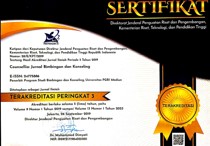Indicators of professional competencies in research of Guidance and Counseling Teachers
DOI:
https://doi.org/10.25273/counsellia.v9i1.3927Keywords:
counselor competence, research, guidance and counselingAbstract
Downloads
References
Baharun, H. (2018). Peningkatan kompetensi guru melalui sistem kepemimpinan kepala madrasah. At-Tajdid: Jurnal Ilmu Tarbiyah, 6(1), 1-26.
Balkin, R. S., & Sheperis, C. J. (2011). Evaluating and reporting statistical power in counseling research. Journal of Counseling & Development, 89(3), 268-272. DOI: https://doi.org/10.1002/j.1556-6678.2011.tb00088.x
Bhakti, C. P. (2015). Bimbingan Dan Konseling Komprehensif: Dari Paradigma Menuju Aksi. Jurnal Fokus Konseling, 1(2).
Hartini, S., Bhakti, C. P., & Hartanto, D. (2016, August). MODEL PENGUATAN KOMPETENSI PROFESIONAL GURU BIMBINGAN DAN KONSELING (Telaah Model Hipotetik pada Guru Bimbingan dan Konseling di DI Yogyakarta). In Prosiding Seminar Nasional Inovasi Pendidikan. DOI: https://doi.org/10.25273/counsellia.v7i1.1163
Blessing, L. T., & Chakrabarti, A. (2009). DRM, a design research methodology. Springer Science & Business Media. DOI: https://doi.org/10.1007/978-1-84882-587-1
Chen, X. P. (2011). Author ethical dilemmas in the research publication process. Management and Organization Review, 7(3), 423-432. DOI: https://doi.org/10.1111/j.1740-8784.2011.00229.x
Dahir, C. A., & Stone, C. B. (2009). School counselor accountability: The path to social justice and systemic change. Journal of Counseling & Development, 87(1), 12-20. DOI: https://doi.org/10.1002/j.1556-6678.2009.tb00544.x
Danim, S., & Darwis (2003) Metode Penelitian Kebidanan Prosedur, Kebijakan, dan Etik. Jakarta : Penerbit Buku Kedokteran EGC.
Denzin, N. K., & Lincoln, Y. S. (2008). Introduction: The discipline and practice of qualitative research.
Fajri, E. M. (2009). Zul, and Ratu Aprilia Senja. Kamus Lengkap Bahasa Indonesia,. Surabaya: Difa Publisher.
Flowerdew, J. (2015). Some thoughts on English for research publication purposes (ERPP) and related issues. Language Teaching, 48(2), 250-262. DOI: https://doi.org/10.1017/S0261444812000523
Hays, D. G. (2010). Introduction to counseling outcome research and evaluation. Sage Journal: Counseling Outcome Research and Evaluation, 1(1), 1-7. DOI: https://doi.org/10.1177/2150137809360006
Heppner, P.P., Wampold, B.E., & Kivlighan Jr., D.M. (2008). Reserach Design in Counseling. Belmont: Thomson Brooks/ Cole
Hidayah, N. (2012). Process-Audit dalam Penyelenggaraan Pendidikan Akademik Jenjang S-1 Bimbingan dan Konseling. Jurnal Pendidikan dan Pembelajaran (JPP), 17(2), 129-139.
Hunt, B. (2011). Publishing qualitative research in counseling journals. Journal of Counseling & Development, 89(3), 296-300. DOI: https://doi.org/10.1002/j.1556-6678.2011.tb00092.x
Huutoniemi, K., Klein, J. T., Bruun, H., & Hukkinen, J. (2010). Analyzing interdisciplinarity: Typology and indicators. Research Policy, 39(1), 79-88. DOI: https://doi.org/10.1016/j.respol.2009.09.011
Ifdil, I. (2010). Pendidikan Karakter dalam Bimbingan dan Konseling. Pedagogi: Jurnal Ilmu Pendidikan, 10(2), 55-61. DOI: https://doi.org/10.24036/pedagogi.v10i2.2232
Jatmiko, W., dkk. (2015). Penulisan Artikel Ilmiah. Jakarta: Universitas Indonesia
Kincheloe, J. L., & McLaren, P. (2011). Rethinking critical theory and qualitative research. In Key works in critical pedagogy (pp. 285-326). Brill Sense. DOI: https://doi.org/10.1007/978-94-6091-397-6_23
Kuntjojo, D. (2009). Metodologi Penelitian. Universitas Nusantara PGRI Kediri. Kediri.
Leech, N. L., & Onwuegbuzie, A. J. (2010). Guidelines for conducting and reporting mixed research in the field of counseling and beyond. Journal of Counseling & Development, 88(1), 61-69. DOI: https://doi.org/10.1002/j.1556-6678.2010.tb00151.x
Leech, N. L., & Onwuegbuzie, A. J. (2011). Mixed research in counseling: Trends in the literature. Measurement and Evaluation in Counseling and Development, 44(3), 169-180. DOI: https://doi.org/10.1177/0748175611409848
Malik, A. A. (2015). Tingkat Pemahaman Konselor Tentang Kompetensi Professional dalam Pelayanan Bimbingan dan Konseling. Indonesian Journal of Guidance and Counseling: Theory and Application, 4(2).
Menteri Pendidikan Nasional. (2008). Permendiknas No. 27 Tahun 2008 tentang Standar Kualifikasi Akademik dan Kompetensi Konselor. Jakarta: Depdiknas.
Menteri Pendidikan dan Kebudayaan. (2014). Permendikbud No. 111 Tahun 2014 tentang SBimbingan dan Konseling pada Pendidikan Dasar dan Menengah. Jakarta: Depdikbud.
Myrick, R. D. (2011). Developmental guidance and counseling: A practical approach. Educational Media Corporation, PO Box 21311, Minneapolis, MN 55421.
Nurrahmi, H. (2015). Kompetensi profesional guru bimbingan dan konseling. Al-Hikmah, 9(1). DOI: https://doi.org/10.24260/al-hikmah.v9i1.87
Patton, M. Q. (2005). Qualitative research. Encyclopedia of statistics in behavioral science. DOI: https://doi.org/10.1002/0470013192.bsa514
Ray, D. C., Minton, C. A. B., Schottelkorb, A. A., & Brown, A. G. (2010). Singleâ€case design in child counseling research: Implications for counselor education. Counselor Education and Supervision, 49(3), 193-208. DOI: https://doi.org/10.1002/j.1556-6978.2010.tb00098.x
Reiner, S. M., Colbert, R. D., & Pérusse, R. (2009). Teacher perceptions of the professional school counselor role: A national study. Professional School Counseling, 12(5), 2156759X0901200507. DOI: https://doi.org/10.1177/2156759X0901200507
Setyoningtyas, R., Mugiarso, H., & Nusantoro, E. (2014). Persepsi Guru BK tentang Kompetensi Konselor di Sekolah Dasar Swasta Kota Semarang. Indonesian Journal of Guidance and Counseling: Theory and Application, 3(2).
Suharsimi, A, Suhardjono, & Supardi. (2015). Penelitian Tindakan Kelas. Jakarta: Bumi Aksara
Suryono, B. (2016). PUBLIC TRUST DAN PROFESI BK BERMARTABAT MENUJU KARAKTER KONSELOR YANG DIBUTUHKAN. Counsellia: Jurnal Bimbingan dan Konseling, 2(1). DOI: https://doi.org/10.25273/counsellia.v2i1.195
Taneja, S. S., Taneja, P. K., & Gupta, R. K. (2011). Researches in corporate social responsibility: A review of shifting focus, paradigms, and methodologies. Journal of Business Ethics, 101(3), 343-364. DOI: https://doi.org/10.1007/s10551-010-0732-6
Tenopir, C., Allard, S., Bates, B., Levine, K. J., King, D. W., Birch, B., ... & Caldwell, C. (2010). Research Publication Characteristics and Their Relative Values: A.
Wester, K. L., & Borders, L. D. (2014). Research competencies in counseling: A Delphi study. Journal of Counseling & Development, 92(4), 447-458. DOI: https://doi.org/10.1002/j.1556-6676.2014.00171.x
Whiston, S. C., & Quinby, R. F. (2009). Review of school counseling outcome research. Psychology in the Schools, 46(3), 267-272. DOI: https://doi.org/10.1002/pits.20372
White, S. W., & Kelly, F. D. (2010). The school counselor's role in school dropout prevention. Journal of Counseling & Development, 88(2), 227-235. DOI: https://doi.org/10.1002/j.1556-6678.2010.tb00014.x
Downloads
Published
Issue
Section
License
In order to be accepted and published by Counsellia: Jurnal Bimbingan dan Konseling, the author(s) submitting the article manuscript should complete all the review stages. By submitting the manuscript the author(s) agreed to the following terms:
The copyright of received articles shall be assigned to Counsellia: Jurnal Bimbingan dan Konseling. The intended copyright includes the right to publish articles in various forms (including reprints). Counsellia: Jurnal Bimbingan dan Konseling maintain the publishing rights to the published articles.
Authors are allowed to use their articles for any legal purposes deemed necessary without written permission from Counsellia: Jurnal Bimbingan dan Konseling with an acknowledgement of initial publication to this journal.
Author sent the copyright transfer form (here) to the journal.

This work is licensed under a Creative Commons Attribution-NonCommercial-ShareAlike 4.0 International License.






